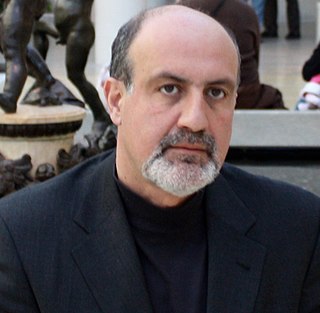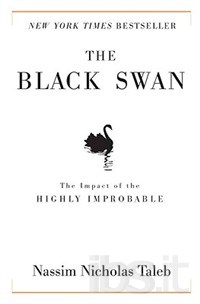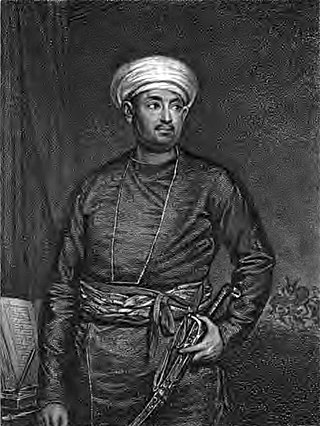The hypothetico-deductive model or method is a proposed description of the scientific method. According to it, scientific inquiry proceeds by formulating a hypothesis in a form that can be falsifiable, using a test on observable data where the outcome is not yet known. A test outcome that could have and does run contrary to predictions of the hypothesis is taken as a falsification of the hypothesis. A test outcome that could have, but does not run contrary to the hypothesis corroborates the theory. It is then proposed to compare the explanatory value of competing hypotheses by testing how stringently they are corroborated by their predictions.

Nassim Nicholas Taleb is a Lebanese-American essayist, mathematical statistician, former option trader, risk analyst, and aphorist whose work concerns problems of randomness, probability, and uncertainty.

Aliah University is a public state university in New Town, West Bengal, India. Previously known as Mohammedan College of Calcutta, it was elevated to university in 2008.

Sufi Abu Taleb was an Egyptian politician. He served as Speaker of the People's Assembly from 1978 to 1983 and, following the assassination of Anwar Sadat on 6 October 1981, assumed the duties of acting head of state for eight days per the Egyptian Constitution. He subsequently stepped aside for Sadat's Vice President Hosni Mubarak.
Abu'l-Husayn al-Basri was a Mu'tazilite jurist and theologian. He wrote al-Mu'tamad fi Usul al-Fiqh, a major source of influence in informing the foundations of Islamic jurisprudence until Fakhr al-Din al-Razi's al-Mahsul fi 'Ilm al-Usul.

Yousef Abu-Taleb is an American actor. He was born in Arlington and raised in Virginia before moving to Los Angeles, California.

The Black Swan: The Impact of the Highly Improbable is a 2007 book by Nassim Nicholas Taleb, who is a former options trader. The book focuses on the extreme impact of rare and unpredictable outlier events—and the human tendency to find simplistic explanations for these events, retrospectively. Taleb calls this the Black Swan theory.
Epistemology or theory of knowledge is the branch of philosophy concerned with the nature and scope (limitations) of knowledge. It addresses the questions "What is knowledge?", "How is knowledge acquired?", "What do people know?", "How do we know what we know?", and "Why do we know what we know?". Much of the debate in this field has focused on analyzing the nature of knowledge and how it relates to similar notions such as truth, belief, and justification. It also deals with the means of production of knowledge, as well as skepticism about different knowledge claims.

Field Marshal Fat'hi Abu Taleb was a Jordanian army general who was the Chairman of the Joint Chiefs of Staff in the Jordanian military. He rose to become one of the most influential military men in Jordanian history. In addition to being a field marshal, he was also served as the head of the General Intelligence Directorate (GID), as well as the military attaché at Jordan's embassy in the United States from 1971 to 1974.
Abu al-Abbas Iranshahri was a 9th-century Persian philosopher, mathematician, natural scientist, historian of religion, astronomer and author. According to traditional sources, he is the first figure in the wider Muslim world to be associated with philosophy after the advent of Islam.
Abu Taleb or Abu Talib may refer to:
Youssef Sabri Abu Taleb Giad Al-Haq was an Egyptian colonel general and the Commander-in-Chief of the Armed Forces.
Feras Taleb Abu Obeid is a Jordanian football goalkeeper who played for Jordan in the 2004 Asian Cup. He also played for Al Buqa.
Nordine Taleb is a French-Canadian professional mixed martial artist. He is currently signed in the Welterweight division of the ARES FC. A professional since 2007, he has also competed for Bellator MMA and Ultimate Fighting Championship for 6 years.
Constantine Sandis is a Greek and British philosopher and entrepreneur. Having worked on philosophy of action, moral psychology, David Hume, and Ludwig Wittgenstein, in 2013 he became Professor of Philosophy at Oxford Brookes University. He is currently Visiting Professor of Philosophy at the University of Hertfordshire, a Founding Director of author services firm Lex Academic and Chief Operations Officer of lexacademic.science.

Mirza Abu Taleb Khan was an Indian tax-collector and administrator of Iranian stock, notable for a memoir of his travels in Britain, Europe and Asia Minor, Masir Talib fi Bilad Afranji, written between circa 1799 and 1805.
David Thomas Richardson was an officer of the Bengal Army or the East India Company and a Hindu scholar who established the company's staff training college at Barasat, but who died with his family when, returning to England from India, their ship, the Lord Nelson was lost in a hurricane in 1808.
Khondakar Abu Taleb (1921-1971) was a Bangladeshi journalist who was killed by Pakistani Army in the Bangladesh Liberation and is considered a "martyr" in Bangladesh.

Muhammad Ibn Abdullah Taleb Amoli known as Talib Amuli and Talib Amoli Iranian Tabari poet was of the early 17th century. He was the poet laureate of the Mughal emperor Jahangir from 1618 till his death. His poetry is in the “Indian Style” of Persian language. A poetry collection (divan) and the poem Talib and Zohre are the works that are left of him today. The fact that he read mathematics, geometry and philosophy in his poems reveals that he received a good education. He is also known to be a good calligrapher. Around 1010 AH, he traveled from Amol to Isfahan and from there to Kashan. After Kashan, the Taleb goes to Mashhad and from there to Marv to serve Bektash Khan. This ruler receives Taleb with respect. But the poet always dreamed of going to India, so he leaves for India. He for some time he lived in Delhi, then in Agra. In the end he ended up at the court of Mirza Ghazi Beg, the Mughal governor of Kandahar.







